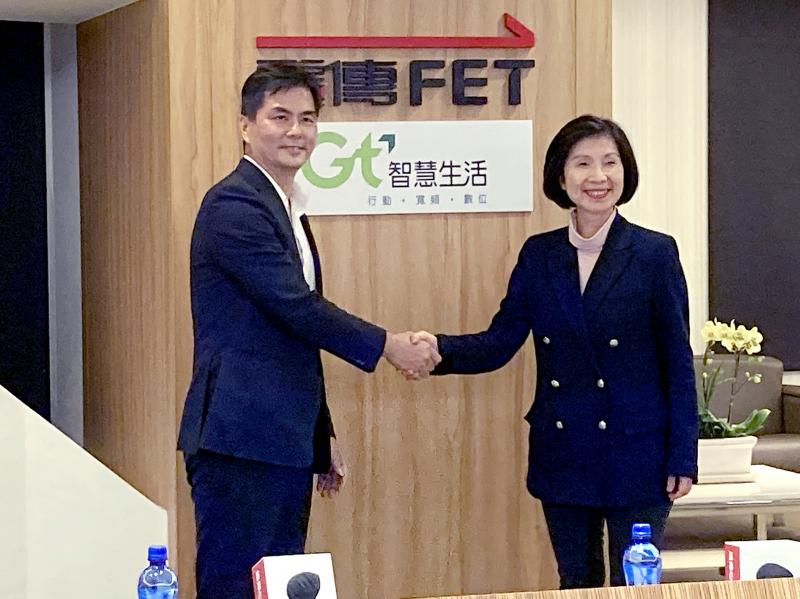Far EasTone Telecommunications Co (遠傳電信) yesterday said it is to merge with Asia Pacific Telecom Co (亞太電信) in a share swap worth about NT$24.7 billion (US$881.48 million), which would be the latest consolidation in Taiwan’s telecom industry.
Based on the statement, each share of Asia Pacific Telecom would be swapped for 0.093 Far EasTone shares.
The deal is expected to be completed on Sept. 30.

Photo: Lisa Wang, Taipei Times
The announcement follows a plan by Taiwan Mobile Co (台灣大哥大) to acquire smaller peer Taiwan Star Telecom Corp (台灣之星) for NT$28.2 billion.
Originally, Far EasTone had planned to increase its stake in Asia Pacific to 23.8 percent this year based on an agreement the two firms signed two years ago.
Far EasTone has an 11.58 percent stake in Asia Pacific.
“However, after our peers announced their merger plan in December last year, we thought our strategy should evolve with the changes in the market and the industry landscape,” Far EasTone president Chee Ching (井琪) told a news conference in Taipei.
Far EasTone expects to see synergy during the first year after the merger, as it would expand its 5G bandwidth and customer base.
Far EasTone would become the nation’s No. 2 telecom operator after the merger, with 9.2 million subscribers, surpassing Taiwan Mobile and Taiwan Star’s combined 9.12 million.
Far EasTone expects the health of the nation’s telecom industry to improve with the deals, as pricing competition would diminish with the reduction of operators to three from five, Ching said.
Hopefully with fewer players, bandwidth auctions would be less competitive, leading to reasonable bidding, she said.
Hon Hai Precision Industry Co (鴻海精密), which has a 36 percent stake in Asia Pacific, would hold 4 percent of Far EasTone after the transaction is completed.

Intel Corp chief executive officer Lip-Bu Tan (陳立武) is expected to meet with Taiwanese suppliers next month in conjunction with the opening of the Computex Taipei trade show, supply chain sources said on Monday. The visit, the first for Tan to Taiwan since assuming his new post last month, would be aimed at enhancing Intel’s ties with suppliers in Taiwan as he attempts to help turn around the struggling US chipmaker, the sources said. Tan is to hold a banquet to celebrate Intel’s 40-year presence in Taiwan before Computex opens on May 20 and invite dozens of Taiwanese suppliers to exchange views

Application-specific integrated circuit designer Faraday Technology Corp (智原) yesterday said that although revenue this quarter would decline 30 percent from last quarter, it retained its full-year forecast of revenue growth of 100 percent. The company attributed the quarterly drop to a slowdown in customers’ production of chips using Faraday’s advanced packaging technology. The company is still confident about its revenue growth this year, given its strong “design-win” — or the projects it won to help customers design their chips, Faraday president Steve Wang (王國雍) told an online earnings conference. “The design-win this year is better than we expected. We believe we will win

Quanta Computer Inc (廣達) chairman Barry Lam (林百里) is expected to share his views about the artificial intelligence (AI) industry’s prospects during his speech at the company’s 37th anniversary ceremony, as AI servers have become a new growth engine for the equipment manufacturing service provider. Lam’s speech is much anticipated, as Quanta has risen as one of the world’s major AI server suppliers. The company reported a 30 percent year-on-year growth in consolidated revenue to NT$1.41 trillion (US$43.35 billion) last year, thanks to fast-growing demand for servers, especially those with AI capabilities. The company told investors in November last year that

Power supply and electronic components maker Delta Electronics Inc (台達電) yesterday said it plans to ship its new 1 megawatt charging systems for electric trucks and buses in the first half of next year at the earliest. The new charging piles, which deliver up to 1 megawatt of charging power, are designed for heavy-duty electric vehicles, and support a maximum current of 1,500 amperes and output of 1,250 volts, Delta said in a news release. “If everything goes smoothly, we could begin shipping those new charging systems as early as in the first half of next year,” a company official said. The new